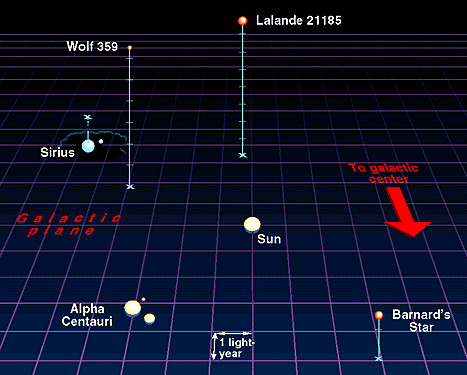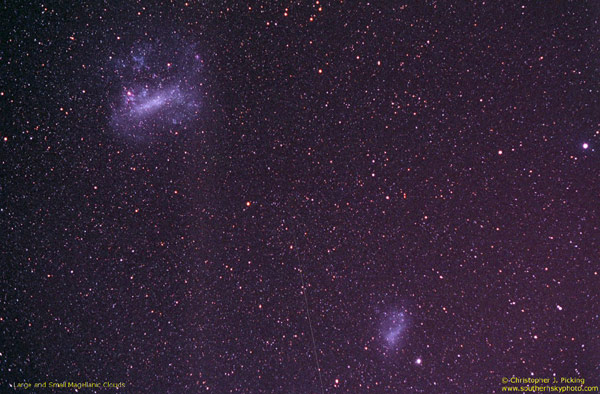"... Earth is one planet among ten or so (depending on how you count) revolving around an atypical star, our sun. On the distance scale of human experience, the solar system is immense. Earth is one hundred and fifty million kilometers from the sun. Pluto is some six billion kilometers away. The Oort cloud of comets, which marks the edge of the solar system, extends to thirty trillion kilometers from the sun. Although the space between the planets contains smaller asteroids, comets, and dust, the solar system consists mainly of empty space that seems to serve no purpose.
On this distance scale, the planets are tiny points. Yet they are huge on the human scale. The diameter of Earth is 12,742 kilometers. The largest planet, Jupiter, is 139,822 kilometers in diameter.
Beyond the solar system we find even more space. The next closest star (after the sun), Proxima Centauri, is forty trillion kilometers away. This is part of the triple-star system called Alpha Centauri. On this scale we should start using light-years as the unit of distance, where the light-year is the distance traveled by light in a year (9.45 trillion kilometers). The Alpha Centauri system is 4.22 light years away. Note that multiple-star systems, which are very common, do not provide the kind of orbital stability we experience on Earth that is very important to our survival. It would seem that only single-star systems are likely to support life, another indication that life is not high on the universe's agenda.
Our sun and its planetary system are well away from the center of a galaxy containing an estimated two hundred to four hundred billion other stars. Called the 'Milky Way,' after the band of stars we see across the sky on a clear night, our visible galaxy is a flat, spiral disk one hundred thousand light-years across, and about ten thousand light-years thick.
The Milky Way is but one of perhaps a hundred billion galaxies in the visible universe. We have two satellite galaxies, just outside the Milky Way, the Large and Small Magellanic Clouds. The next galaxy nearest to us, Andromeda, is 2.44 million light-years away.
And, you might ask, how big is the universe? The farthest observed galaxy at this writing, Abell 1825 IR1916, is 13.2 billion light-years away. Since it has taken 13.2 billion light years for its light to reach us and the current estimate of the age of the universe is 13.7 billion years, we are seeing this galaxy as it was only five hundred million years after the start of the big bang. Because the universe has been expanding since the light left Abell, this galaxy is now about forty billion light-years away.
The farthest distance we can ever hope to see, what is called our horizon, is 13.7 billion light-years from Earth. Beyond that, light would take longer than the age of the universe to reach us. As vast as is the universe within our horizon, cosmology suggests that a far vaster one lies beyond. If the inflationary big bang model of the early universe is correct, then in a tiny time interval (something like 10 to the -35th second), the universe expanded in size by a factor that is almost impossible to imagine. Here is one estimate of that factor. Write down the number 1 and follow it by a hundred zeros. Then raise the number 10 to that power (10 to 10 to the 100th power). I have not been able to think of any analogy from common experience or science to help visualize that number. The size of the visible universe (10 to the 26th power meters) is only 10 to the 61st power times larger than the smallest distance that can be defined, the Planck distance (10 to the -35th meter)."
... From Victor J. Stenger's God, the failed hypothesis, pages 155-57
On this distance scale, the planets are tiny points. Yet they are huge on the human scale. The diameter of Earth is 12,742 kilometers. The largest planet, Jupiter, is 139,822 kilometers in diameter.
Beyond the solar system we find even more space. The next closest star (after the sun), Proxima Centauri, is forty trillion kilometers away. This is part of the triple-star system called Alpha Centauri. On this scale we should start using light-years as the unit of distance, where the light-year is the distance traveled by light in a year (9.45 trillion kilometers). The Alpha Centauri system is 4.22 light years away. Note that multiple-star systems, which are very common, do not provide the kind of orbital stability we experience on Earth that is very important to our survival. It would seem that only single-star systems are likely to support life, another indication that life is not high on the universe's agenda.
Our sun and its planetary system are well away from the center of a galaxy containing an estimated two hundred to four hundred billion other stars. Called the 'Milky Way,' after the band of stars we see across the sky on a clear night, our visible galaxy is a flat, spiral disk one hundred thousand light-years across, and about ten thousand light-years thick.
The Milky Way is but one of perhaps a hundred billion galaxies in the visible universe. We have two satellite galaxies, just outside the Milky Way, the Large and Small Magellanic Clouds. The next galaxy nearest to us, Andromeda, is 2.44 million light-years away.
And, you might ask, how big is the universe? The farthest observed galaxy at this writing, Abell 1825 IR1916, is 13.2 billion light-years away. Since it has taken 13.2 billion light years for its light to reach us and the current estimate of the age of the universe is 13.7 billion years, we are seeing this galaxy as it was only five hundred million years after the start of the big bang. Because the universe has been expanding since the light left Abell, this galaxy is now about forty billion light-years away.
The farthest distance we can ever hope to see, what is called our horizon, is 13.7 billion light-years from Earth. Beyond that, light would take longer than the age of the universe to reach us. As vast as is the universe within our horizon, cosmology suggests that a far vaster one lies beyond. If the inflationary big bang model of the early universe is correct, then in a tiny time interval (something like 10 to the -35th second), the universe expanded in size by a factor that is almost impossible to imagine. Here is one estimate of that factor. Write down the number 1 and follow it by a hundred zeros. Then raise the number 10 to that power (10 to 10 to the 100th power). I have not been able to think of any analogy from common experience or science to help visualize that number. The size of the visible universe (10 to the 26th power meters) is only 10 to the 61st power times larger than the smallest distance that can be defined, the Planck distance (10 to the -35th meter)."
... From Victor J. Stenger's God, the failed hypothesis, pages 155-57






4 comments:
Thanks. Lovely photos.
And what are the things we're doing that will probably destroy us?
dick cheney and stephen harper's devotion to the oil industry?
Some Bible bullshit?
Consumer capitalism in general?
Bah!
I love this stuff. It puts my own mortality in such stark perspective. We really do fret so much over what's truly, in the greater scheme, as close to nothing as possible.
MoS,
Something about the chapter that comes from really conveyed that the universe is bigger than we can really comprehend because it wasn't made for us.
We evolved for this planet. This speck in that vast universe. And even this speck is indifferent to whether we survive or perish.
So it's this world that we should care about, for our own sakes. But idiots like cheney, harper, religious nutbars, etc., ... seem determined to fuck it all up.
Post a Comment